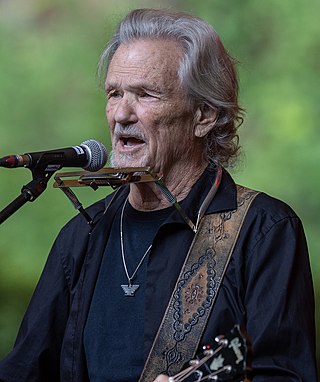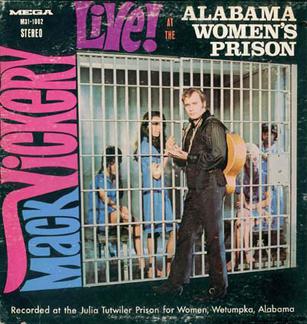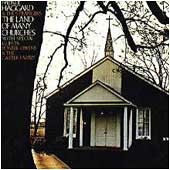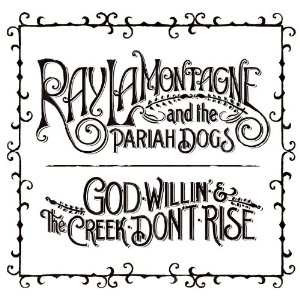
Kristoffer Kristofferson is an American retired country singer, songwriter, and actor. Among his songwriting credits are "Me and Bobby McGee", "For the Good Times", "Sunday Mornin' Comin' Down", and "Help Me Make It Through the Night", all of which were hits for other artists.

John LaGale Horton was an American country, honky tonk and rockabilly musician during the 1950s. He is best known for a series of history-inspired narrative country saga songs that became international hits. His 1959 single "The Battle of New Orleans" was awarded the 1960 Grammy Award for Best Country & Western Recording. The song was awarded the Grammy Hall of Fame Award and in 2001 ranked No. 333 of the Recording Industry Association of America's "Songs of the Century". His first No. 1 country song was in 1959, "When It's Springtime in Alaska ".
Talking blues is a form of folk music and country music. It is characterized by rhythmic speech or near-speech where the melody is free, but the rhythm is strict.
This is a list of notable events in country music that took place in the year 1970.
Country USA was a 23-volume series issued by Time-Life Music during the late 1980s and early 1990s, spotlighting country music of the 1950s through early 1970s.
Contemporary Country is a 22-volume series issued by Time-Life during the early 1990s, spotlighting country music of the 1970s through mid 1990s.
"Cocaine Blues" is a Western swing song written by Troy Junius Arnall, a reworking of the traditional song "Little Sadie." Roy Hogsed recorded a well known version of the song in 1947.

The Almeria Club Recordings is the forty-ninth studio album by American country music artist Hank Williams Jr. It was released on January 8, 2002, by Curb Records. He recorded most of the songs at "The Almeria Club", a club that his father, Hank Williams, recorded several songs himself. Kid Rock as well as Uncle Kracker appear on the song "The 'F' Word" giving background vocals.

The Legend is a box set by country singer Johnny Cash, released in 2005 on Columbia Records and Legacy Recordings. It is one of the few multi-disc sets that contain songs recorded throughout Cash's entire career, from 1955 to 2003. Over four CDs, most of Cash's biggest hits are covered, in addition to numerous traditional compositions Cash recorded versions of, and several collaborations with other known artists, including Rosanne Cash, U2 and Bob Dylan. In keeping with Cash's persona as the Man in Black, the data surface of the discs is black. In 2006, the set won the Grammy Award for Best Boxed or Special Limited Edition Package. It was certified Gold on January 11, 2006, by the RIAA.

Waylon and Company is an album by American country music artist Waylon Jennings, released on RCA Records in 1983.

Mack Vickery, also known as Atlanta James and Vick Vickers, was an American musician, songwriter, and inductee in the Hillbilly Hall of Fame and Alabama Music Hall of Fame. His songs have been recorded by artists such as Jerry Lee Lewis, Waylon Jennings, George Thorogood, Johnny Cash, George Strait, Hank Williams Jr., George Jones.

The Land of Many Churches is the fifteenth studio album and the double live gospel album by Merle Haggard and The Strangers released on Capitol Records in 1971.

God Willin' & the Creek Don't Rise is singer-songwriter Ray LaMontagne's fourth full-length release, which was released on August 17, 2010.

Have a Little Talk With Myself is the fifth studio album by Ray Stevens and his third and final for Monument Records, released in 1969. Stevens left Monument in early 1970 and signed with Andy Williams' Barnaby Records label. This album is quite different from Stevens's previous albums, for he concentrates on interpreting the works of other writers, and only contributes two of his own compositions. The cover versions include Bob Dylan's "I'll Be Your Baby Tonight", the First Edition's hit "But You Know I Love You", two songs from the musical Hair, three songs of the Beatles, Blood, Sweat & Tears' hit "Spinning Wheel", and Joe South's hit "Games People Play".
"Lord willing" is a traditional English phrase related to a verse in the Epistle of James:
James 4:15 "You should say, "If the Lord wills, we shall live and do this or that.""

Don't Stop Me Now! is the eleventh studio album by Cliff Richard, released in 1967. It is his twentieth album overall. The album was arranged and conducted by Mike Leander.
The expression "...the creek don't rise" is an American slang expression implying strong intentions subject to complete frustration by uncommon but not unforeseeable events. It presumably evokes occasional and unpredictably extreme rainfall in Appalachia, that has historically isolated one rural neighborhood or another temporarily inaccessible on several or many occasions. It is sometimes thought that the word "Creek" instead refers to the Creek Indians, but this is unlikely.









